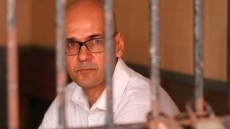TORONTO — Canadian prison authorities are still looking at ways to cut the use of segregation and the time prisoners are forced to spend in isolation, the government said Thursday in responding to the Ashley Smith inquest.
The jury in the inquest into the choking death of the mentally disturbed teen made 104 recommendations a year ago.
"This strategy is intended to reframe the thinking about how segregation is used," the Correctional Service of Canada said in its report.
"The goal of the strategy is to reduce the reliance on segregation by creating better options and finding more innovative alternatives for safe reintegration."
The service said it would consult further in hopes of developing options by June 2015.
Among other things, the Smith jurors recommended that "indefinite solitary confinement" be abolished and that long-term segregation not exceed 15 days. They also wanted restrictions on the number of periods that offenders can spend segregated.
In its 26-page response, the government rejects the term "solitary confinement." Instead, it states, Canadian law and correctional policy allow for "administrative segregation."
Lawyer Julian Roy, one of the lawyers who represented Smith's family at the inquest, said CSC's refusal to use the "solitary confinement" label as the jurors deliberately did is emblematic of the approach.
"They're playing the Orwellian game," Roy said.
"That bodes very poorly for them honestly dealing with this crisis in the system — that they can't even call it what it is."
Smith, 19, of Moncton, N.B., strangled herself in her segregation cell in Kitchener, Ont., in October 2007. Prison guards, under orders not to intervene, videotaped her as she died. She had spent most of the last three years of her life in segregation.
The prison service also said it planned to complete by March a review of how guards are supposed to react to medical emergencies, incidents of self-harm, and offenders with mental health disorders.
In her last year, she was transferred between institutions 17 times, further isolating her from her mother.
The service said it has already adopted a policy of only transferring suicidal inmates to a treatment facility, unless a mental-health professional decides otherwise.
It also announced Thursday that it had signed a five-year deal with a mental hospital in Brockville, Ont., to provide access to two inpatient beds for high-needs female inmates.
In addition, by March, only emergency transfers will take place on Fridays or holidays so that resources are in place for the arrival of a high-needs complex case, the government said.
The service also said it hoped to have a new policy in place by March to allow for enhanced communication between inmates and family through video communication. Also, relatives would not have to repeatedly apply for clearance from each new institution, authorities said.
Smith's sentence — originally just weeks — ballooned because of in-custody infractions. As part of its efforts to avoid a repeat of the situation, Ottawa pledged to ensure an inmate's mental-health issues are shared with police and prosecutors when it comes to alleged criminal misconduct.
CSC also said it would make a case study of Smith's experience part of its educational materials for all staff to "best offer a comprehensive understanding of the actions and gaps in this case."
Public Safety Minister Steven Blaney said the jurors' recommendations were a "valuable contribution" to the prison system's review of its mental health services.
"CSC's response to those recommendations sets the stage for continued improvement to our capacity to provide the appropriate care and facilities for those offenders with complex mental health needs."





